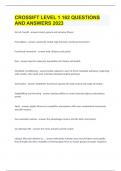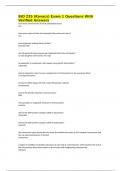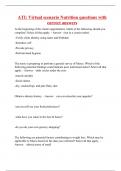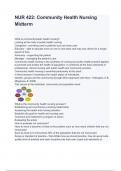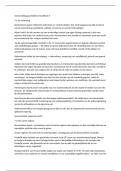Administrative Law and Market Regulation
-Week 1:
I. Introduction to Administrative Law and the World’s Most Influential Systems of
Administrative Law. What is Regulation?
1. Definitions
-> Theranos case; Mrs. Holmes invented the ‘Theranos’ , a medical device that could detect
hundreds of health issues from a single blood sample, many investors were involved - The
device turned out to be fraudulent which produced inaccurate results.
-> public interests: price of theranos, efficiency and general public interests
(individuals would buy theranos themselves, doctors could receive faster results and prevent
spreading of diseases)
-> private interests; pharmaceuticals & insurance companies bcs this product
had the potential of revolutionizing the private health sector
-> if her products had been regulated or if a third party made sure the products were
scientifically approved this would have not gone as far
-> Regulation is often a mix between public and private interests or between public and
private regulations
-> Administrative Law regulates the relationship between us, individuals and public
bodies and aims to protect citizens - foremost their health and safety, but it depends on
the approaches
1. French approach; adm law is a body of rules that organizes government and its
public bodies
-> sees this as law of organization, not law to protect rights but how
institutions are organized
2. German approach; adm law is a body of rules that protects citizens against the
actions of public authorities
-> strong value on citizen protection
3. American approach suggests that administrative law is a body of law that allows for
the creation of public regulatory agencies and contains all of the statutes, judicial
decisions and regulations that govern them
-> focus on large public bodies regulating specific sectors
-> also hybrid approaches like Dutch admin law; mix between German and French approach
but with the inclusion of agencies which occupy small specified areas of law
-> Adm law defines constitutional law in specific situations - constitutional law defines
fundamental rights that every citizen has and gives an outline, and adm law fills in the
specifics and the procedures
-> for instance getting your BSN number, starting a company, getting a passport,
getting vaccinated etc
-> Example of Airbnb: To open a hotel, you need correct licensing - to rent an airbnb you
don’t, this can be problematic
-> Amsterdam regulated how many airbnbs are allowed to operate
, -> public interests; safety, affordability and livability of local housing
-> private interests; hosts, guests and platforms offering a similar service
-> Regulation is any control system that contains a minimum of 3 components:
1. capacity for standard-setting; to allow a distinction to be made between the “wrong”
and “right” behavior - set standards of behavior
2. capacity to gather or monitor information; to produce knowledge about current or
changing states of the system
3. behavior-modification; some capacity to change the state of the system - carry the
force of law to change behavior ex. covid restrictions on free movement
-> Regulation is often focused on specific sectors for ex. financial markets, energy, telecoms
etc
->Regulation keeps changing because of the new challenges in public law such as
Multi-level governance, global influence and the impact of private actors
-> for example big companies like Amazon or Nestle will have regulations make sure
their workers are in good hands
Fairtrade example: FairTrade symbol shows the consumer that this item has been distributed
according to fairtrade rules
-> consumers value the symbol on their products; regulate the behavior of the
consumer
-> non-administrative regulation because not part of law/not government-mandated
-> private or hybrid regulation
2. Why regulate?
-> Child benefit scandal: many families were wrongly accused of receiving child benefits that
they should not have received, parents had to file their income and thus get the benefits but
there was a clear ethnic profiling/ racist behavior towards certain people - government did
not help them even if they should have
-> Regulation helps protect the consumer and the seller if these are private people for
example airbnb should be regulated to protect the consumer, the owner of the house and the
property - can be regulations in different sectors
- Economic Regulation: the government control of firm behavior of industries
characterized by a lack of competition (traditionally national monopolies) for example
electricity prices
-> it is helpful to have regulations in economic sectors to protect the consumer, in the
example of the UK today, gas prices keep rising to a point that it is not affordable for families
- therefore if regulation in economic sectors existed the prices could be maintained
regardless if the market changes -> focus on competition
- Social Regulation: the government control of individual and firm behavior with
respect to the environmental, health and safety implications of the production and
consumption of goods and services for example smoking regulations in specific places or
how long a product is edible -> focus on behavior and protection of human health
, 3. Theories on Regulation
-> Regulation is a balance between public and private but theories exist suggesting that
there shouldn't be a balance but a focus
-> Theories of Regulation are public and private
Public Interest theories:
Public Interest Theory I: regulation pursues collective goals with the aim of
promoting the general welfare of the community -> pursuit of the public interest as a whole
and not individual ex. climate awareness
Public Interest Theory II: suggests that regulation addresses market failures and
efficient government intervention therefore it increases social welfare and is beneficial
Private Interest theories
Private Interest Theory I: theory by Buchanan regulation benefits particular groups
in society and not always the entirety of the public - individuals behind agencies work for
their own interests
Private Interest Theory II: regulation is designed depending on who has the most to
win or lose - groups with a common goal can influence regulation; businesses can
shape/influence the law, for example to control over who enters the market as a competitor
Private Interest Theory III: theory by Stigler companies seek subsidies, control over
competitive entries or price fixtures from the government for ex. “entry barriers” - ways to
disadvantage substitute products
-> often put pressure on governments to achieve goals
-> Regulatory capture and regulatory failure can occur as a result of private interest
regulation;
Regulatory failure: private interests prevail and regulators fail to primarily protect
the public interest
Regulatory capture: one of the reasons of regulatory failure, regulators become
“captured” by giving into the interests of lobbies or special interest groups
-> Dutch Plofkip example: cheap chicken which would rapidly produce due to the growing
hormones
-> problematic because the growing was inhumane and the hormones were harmful
to human health
-> but difficult to regulate because food companies would go against public
regulations and create immense pressure= captured regulators
-> Example of CO2 certificates: products do not have to write on their packaging how much
CO2 was emitted and this due to different interests
-> Public Interest theory of CO2 example: it could be justified considering
global warming but gathering information could be too expensive for the general public
-> Private Interest theory: farming and transport industries not willing to reveal
information on their CO2 footprint
-> Baptist and bootleggers Theory: During the Great Depression in the US, the
government had a “dry law” in place which prohibited the selling of alcohol
, -> 2 interest groups touched by this; the baptists and the bootleggers, so people that
smuggle and produce illegal alcohol
-> the baptists were satisfied by the dry law because of their religious beliefs, but so were
the bootleggers because that meant that they could sell more alcohol on the black market
(because no competition)
= different groups can establish a common goal through different interests
-Week 2:
I. Who regulates, and How does regulation take place?
1. What is a public authority?
-> General administrative law is applicable to all public bodies - except if there are more
specific rules
-> Administrative courts take cases between citizens and governments - try to reduce the
inequality (because gov has more knowledge and power) & usually more lenient on citizens
than civil courts and more likely to achieve preferable result
-> Civil courts take cases between two or more private parties and does not acknowledge
the disadvantage of citizens
-> important to know if the case involved a public figure (go to adm court) or private
(civil court)
-> Public authority is a representation of a government, and can be parts of the government,
ministers, police officers, mayors…
-> different types can be:
- central governmental level; ex. secretary of state, ministries and airport customs
- decentralized level; police, aiderman, mayor, …
- independent agencies: regulators or state-mandated bodies
- private/hybrid status - private regulators possessing limited powers of public
authorities
-> Criteria for public authorities: (if not obvious, formal part of government)
1. some form of control by the government; supervision, appointment, mandate or
inspection
2. public financing; more than 50% of the funding from government
3. exercising public function which is in the public interest
-> if basis in law then its clearly public authority
-> if no info given about control or financing, it is difficult to determine the status but if there’s
a level of control by the government it could be a “public-private body”/hybrid model
suggesting involvement of the government
RUG example: public university boards are public authorities, RUG can exercise public
functioning (ex. make degrees), are financed by the ministry of education their decisions and
may be challenged in administrative courts
-> Blanco case: in 1873 child was severely injured by a wagon crossing the road, the wagon
was owned by a state-owned tobacco company
-> Should the company be considered as part of the state? Should parents go to adm
or civil court?
-Week 1:
I. Introduction to Administrative Law and the World’s Most Influential Systems of
Administrative Law. What is Regulation?
1. Definitions
-> Theranos case; Mrs. Holmes invented the ‘Theranos’ , a medical device that could detect
hundreds of health issues from a single blood sample, many investors were involved - The
device turned out to be fraudulent which produced inaccurate results.
-> public interests: price of theranos, efficiency and general public interests
(individuals would buy theranos themselves, doctors could receive faster results and prevent
spreading of diseases)
-> private interests; pharmaceuticals & insurance companies bcs this product
had the potential of revolutionizing the private health sector
-> if her products had been regulated or if a third party made sure the products were
scientifically approved this would have not gone as far
-> Regulation is often a mix between public and private interests or between public and
private regulations
-> Administrative Law regulates the relationship between us, individuals and public
bodies and aims to protect citizens - foremost their health and safety, but it depends on
the approaches
1. French approach; adm law is a body of rules that organizes government and its
public bodies
-> sees this as law of organization, not law to protect rights but how
institutions are organized
2. German approach; adm law is a body of rules that protects citizens against the
actions of public authorities
-> strong value on citizen protection
3. American approach suggests that administrative law is a body of law that allows for
the creation of public regulatory agencies and contains all of the statutes, judicial
decisions and regulations that govern them
-> focus on large public bodies regulating specific sectors
-> also hybrid approaches like Dutch admin law; mix between German and French approach
but with the inclusion of agencies which occupy small specified areas of law
-> Adm law defines constitutional law in specific situations - constitutional law defines
fundamental rights that every citizen has and gives an outline, and adm law fills in the
specifics and the procedures
-> for instance getting your BSN number, starting a company, getting a passport,
getting vaccinated etc
-> Example of Airbnb: To open a hotel, you need correct licensing - to rent an airbnb you
don’t, this can be problematic
-> Amsterdam regulated how many airbnbs are allowed to operate
, -> public interests; safety, affordability and livability of local housing
-> private interests; hosts, guests and platforms offering a similar service
-> Regulation is any control system that contains a minimum of 3 components:
1. capacity for standard-setting; to allow a distinction to be made between the “wrong”
and “right” behavior - set standards of behavior
2. capacity to gather or monitor information; to produce knowledge about current or
changing states of the system
3. behavior-modification; some capacity to change the state of the system - carry the
force of law to change behavior ex. covid restrictions on free movement
-> Regulation is often focused on specific sectors for ex. financial markets, energy, telecoms
etc
->Regulation keeps changing because of the new challenges in public law such as
Multi-level governance, global influence and the impact of private actors
-> for example big companies like Amazon or Nestle will have regulations make sure
their workers are in good hands
Fairtrade example: FairTrade symbol shows the consumer that this item has been distributed
according to fairtrade rules
-> consumers value the symbol on their products; regulate the behavior of the
consumer
-> non-administrative regulation because not part of law/not government-mandated
-> private or hybrid regulation
2. Why regulate?
-> Child benefit scandal: many families were wrongly accused of receiving child benefits that
they should not have received, parents had to file their income and thus get the benefits but
there was a clear ethnic profiling/ racist behavior towards certain people - government did
not help them even if they should have
-> Regulation helps protect the consumer and the seller if these are private people for
example airbnb should be regulated to protect the consumer, the owner of the house and the
property - can be regulations in different sectors
- Economic Regulation: the government control of firm behavior of industries
characterized by a lack of competition (traditionally national monopolies) for example
electricity prices
-> it is helpful to have regulations in economic sectors to protect the consumer, in the
example of the UK today, gas prices keep rising to a point that it is not affordable for families
- therefore if regulation in economic sectors existed the prices could be maintained
regardless if the market changes -> focus on competition
- Social Regulation: the government control of individual and firm behavior with
respect to the environmental, health and safety implications of the production and
consumption of goods and services for example smoking regulations in specific places or
how long a product is edible -> focus on behavior and protection of human health
, 3. Theories on Regulation
-> Regulation is a balance between public and private but theories exist suggesting that
there shouldn't be a balance but a focus
-> Theories of Regulation are public and private
Public Interest theories:
Public Interest Theory I: regulation pursues collective goals with the aim of
promoting the general welfare of the community -> pursuit of the public interest as a whole
and not individual ex. climate awareness
Public Interest Theory II: suggests that regulation addresses market failures and
efficient government intervention therefore it increases social welfare and is beneficial
Private Interest theories
Private Interest Theory I: theory by Buchanan regulation benefits particular groups
in society and not always the entirety of the public - individuals behind agencies work for
their own interests
Private Interest Theory II: regulation is designed depending on who has the most to
win or lose - groups with a common goal can influence regulation; businesses can
shape/influence the law, for example to control over who enters the market as a competitor
Private Interest Theory III: theory by Stigler companies seek subsidies, control over
competitive entries or price fixtures from the government for ex. “entry barriers” - ways to
disadvantage substitute products
-> often put pressure on governments to achieve goals
-> Regulatory capture and regulatory failure can occur as a result of private interest
regulation;
Regulatory failure: private interests prevail and regulators fail to primarily protect
the public interest
Regulatory capture: one of the reasons of regulatory failure, regulators become
“captured” by giving into the interests of lobbies or special interest groups
-> Dutch Plofkip example: cheap chicken which would rapidly produce due to the growing
hormones
-> problematic because the growing was inhumane and the hormones were harmful
to human health
-> but difficult to regulate because food companies would go against public
regulations and create immense pressure= captured regulators
-> Example of CO2 certificates: products do not have to write on their packaging how much
CO2 was emitted and this due to different interests
-> Public Interest theory of CO2 example: it could be justified considering
global warming but gathering information could be too expensive for the general public
-> Private Interest theory: farming and transport industries not willing to reveal
information on their CO2 footprint
-> Baptist and bootleggers Theory: During the Great Depression in the US, the
government had a “dry law” in place which prohibited the selling of alcohol
, -> 2 interest groups touched by this; the baptists and the bootleggers, so people that
smuggle and produce illegal alcohol
-> the baptists were satisfied by the dry law because of their religious beliefs, but so were
the bootleggers because that meant that they could sell more alcohol on the black market
(because no competition)
= different groups can establish a common goal through different interests
-Week 2:
I. Who regulates, and How does regulation take place?
1. What is a public authority?
-> General administrative law is applicable to all public bodies - except if there are more
specific rules
-> Administrative courts take cases between citizens and governments - try to reduce the
inequality (because gov has more knowledge and power) & usually more lenient on citizens
than civil courts and more likely to achieve preferable result
-> Civil courts take cases between two or more private parties and does not acknowledge
the disadvantage of citizens
-> important to know if the case involved a public figure (go to adm court) or private
(civil court)
-> Public authority is a representation of a government, and can be parts of the government,
ministers, police officers, mayors…
-> different types can be:
- central governmental level; ex. secretary of state, ministries and airport customs
- decentralized level; police, aiderman, mayor, …
- independent agencies: regulators or state-mandated bodies
- private/hybrid status - private regulators possessing limited powers of public
authorities
-> Criteria for public authorities: (if not obvious, formal part of government)
1. some form of control by the government; supervision, appointment, mandate or
inspection
2. public financing; more than 50% of the funding from government
3. exercising public function which is in the public interest
-> if basis in law then its clearly public authority
-> if no info given about control or financing, it is difficult to determine the status but if there’s
a level of control by the government it could be a “public-private body”/hybrid model
suggesting involvement of the government
RUG example: public university boards are public authorities, RUG can exercise public
functioning (ex. make degrees), are financed by the ministry of education their decisions and
may be challenged in administrative courts
-> Blanco case: in 1873 child was severely injured by a wagon crossing the road, the wagon
was owned by a state-owned tobacco company
-> Should the company be considered as part of the state? Should parents go to adm
or civil court?


